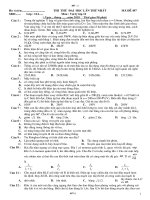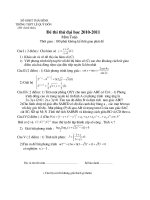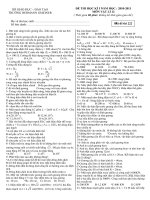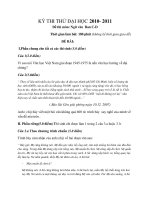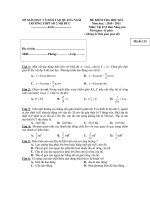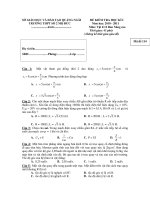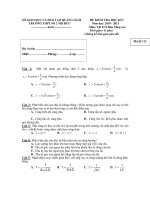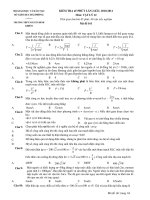KỲ THI THỬ ĐẠI HỌC LẦN II NĂM HỌC: 2010 - 2011 Môn thi: TIẾNG ANH - MÃ ĐỀ THI: 275 ppsx
Bạn đang xem bản rút gọn của tài liệu. Xem và tải ngay bản đầy đủ của tài liệu tại đây (176.8 KB, 10 trang )
TRƯỜNG THPT QUANG TRUNG KỲ THI THỬ ĐẠI HỌC LẦN IINĂM HỌC: 2010 - 2011
ĐỀ CHÍNH THỨC Mụn thi: TIẾNG ANH
(Đề thi có 06 trang) Thời gian làm bài: 90 phút (Không kể thời gian giao đề)
MÃ ĐỀ THI: 275
Họ và tên học sinh: …………………………
Số báo danh: ………….
ĐỀ THI GỒM 80 CÂU (TỪ QUESTION 1 ĐẾN QUESTION 80)
Mark the letter A, B, C or D on your answer sheet to indicate the word that differs from the rest in the
position of the main stress in each of the following questions.
Question 1: A. follow
B. apology
C. experienced
D. direct
Question 2: A. explain
B. obtain
C. promise
D. suspect
Question 3: A. national
B. complain
C. alone
D. accept
Question 4: A. unlucky
B. courage
C. displeased
D. encourage
Question 5: A. reflection
B. attention
C. invention
D. necessary
Mark the letter A, B, C or D on your answer sheet to indicate the correct answer to each of the following
questions.
Question 6: “Why did Brenda drop out of business school?” – “She decided she wasn’t _____ a career in
business. She’s going to study art, instead.”
A. cut out for (= designed for / fitted for)
B. came out for
C. counted out for
D. cared out for
Question 7: How did you _____ up with such strange idea?
A. show
B. look
C. come( =present, offer, announce )
D. get
Question 8: Your wishes coincided _____ mine in this situation.
A. to
B. with ( happend at the same time)
C. within
D. on
Question 9: Steamboats did not replace sailing vessels on the high seas _____ later in the 1860s.
A. until ( prep. + Noun phrase )
B. although
C. because
D. unless
Question 10: He _____ to be offered the job.
A. was such inexperienced ( such + noun )
B. was too inexperienced
C. was not experienced enough
D. B or C
Question 11: Today shire horses are seen more and more in their traditional role _____ work horses.
A. alike
B. as
C. like (prep + noun )
D. as if
Question 12: Elephants evolved from animals that _____ much larger than pigs.
A. were not
B. nor were
C. were no
D. not were
Question 13: Rarely _____ more than 50 miles from the coast.
A. redwood trees grow
B. redwood trees do grow
C. grow redwood trees
D. do redwood trees grow ( Rarely > inversion )
Question 14: On no account _____ in the office be used for personal materials.
A. the photocopy machines
B. should the photocopy machines (On no account > inversion ; passive sentence)
C. the photocopy machines should
D. does the photocopy machines
Question 15: Nine of every ten people in the world _____ in the country in which they were born.
A. living
B. they are living
C. lives
D. live ( a fact > simple present tense )
Question 16: If you just approach the job with the right attitude, things _____ well.
A. would have turned out
B. will turn out ( open conditional sentence)
C. would turn out
D. turns out
Question 17: “I can’t swim.” – “ I wish you _____.”
A. could ( giả định việc/hành động không đúng/ có thật trong hiện tại )
B. can
C. able
D. are able
Question 18: _____ few species that live on the ground, most monkeys live in the trees.
A. There are
B. A
C. All but
D. Except for ( = Apart from )
Question 19: She closed the door _____ left for the city.
A. but
B. and ( nối 2 hành động xảy ra tuần tự trước sau)
C. or
D. therefore
Question 20: He was sent to ___x__ prison for __x___ six months for _x___ shoplifting.
A. x/x/x ( bị đi/ở tù 6 tháng vỡtội ăn cắp trong cửa hàng )
B. the/x/x
Trang 1/6 – Mã đề thi 275
C. x/x/the
D. a/x/a
Question 21: As he was walking past the building site, he got a tiny _____ of dust in his eyes.
A. piece
B. speck
C. string
D. bar
Question 22: His parents’ hostile attitude _____ him to leave home.
A. drove(= cause someone to do something)
B. urged
C. made
D. suggested
Question 23: The judge imposed a light sentence in view of the _____ circumstances.
A. unfair
B. extensive
C. extenuating ( circumstances = trường hợp giảm khinh)
D. qualifying
Question 24: _____ waiting for half an hour he went home in disgust. _____ he was sorry he hadn’t waited
longer.
A. After/ After
B. Then/ After
C. Then/ Afterwards
D. After/ Afterwards ( after : prep / afterwards : conjunctive adverb = and then )
Question 25: The stimulation that infant animals receive affects their behavior _____ they become adults.
A. during
B. since
C. because
D. when
Question 26: This book is _____ the one I read last month.
A. less much interesting
B. the less interesting
C. much less than interesting
D. much less interesting than ( much bổ nghĩa cho less ; comparative )
Question 27: Mr. Harrison is _____ he owns many palaces.
A. so a rich man that ( so rich a man that ) < right
B. such an rich man that ( such a rich man that ) < right
C. such a rich man that
D. that so rich a man
Question 28: Silver is sometimes mixed with copper _____ an alloy that is harder and stronger than pure
silver.
A. to form (= in order to / so as to )
B. forms
C. it forms
D. the forming
Question 29: _____ a successful rock star, a singer must have stage presence and charisma in addition to mere
musical talent.
A. To become (= In order to )
B. Becomes
C. In order becoming
D. For becoming
Question 30: The average temperature of rocks on the surface of the earth _____ 550F.
A. be
B. are
C. is ( a fact > simple present tense ; chủ từ số ít , động từ số ít )
D. been
Question 31: In the ocean, _____ more salt in the deeper water.
A. is there
B. there are
C. there is
D. are there
Question 32: I’m so tired. I didn’t get _____ of sleep last night.
A. a wink ( expression " don't sleep a wink" = stay awake and do not sleep at all )
B. an amount
C. an article
D. A or C
Question 33: When _____ is not known.
A. was the wheel invented
B. the invention of the wheel
C. it was invented the wheel
D. the wheel was invented ( a noun clause subject )
When the wheel was invented is not known .
Question 34: _____ the horse tried to free itself from the restraint, _____ it became.
A. The most/ the tighter
B. The more/ the tighter ( double comparative) > the more, the merrier = càng đông càng vui ; the more
you go, the more you know = đi nhiều , biết nhiều )
C. The more/ tighter
D. More/ tighter
Question 35: _____ in front of a camera lens changes the color of the light that reaches the film.
A. Placed a filter
B. A filter is placed
C. A filter placed ( A filter (S) (that is) placed in front a camera lens changes (V)
D. When a filter placed
Read the following passage and mark the letter A, B, C or D on your answer sheet to indicate the correct
answer to each of the questions from 36 to 45.
For 150 years scientists have tried to determine the solar constant, the amount of solar energy that reaches the
Earth. Yet, even in the most cloud – free regions of the planet, the solar constant cannot be measured precisely.
Gas molecules and dust particles in the atmosphere absorb and scatter sunlight and prevent some wavelengths
of the light from ever reaching the ground.
With the advent of satellites, however, scientists have finally been able to measure the Sun’s output without
being impeded by the Earth’s atmosphere. Solar Max, a satellite from National Aeronautics and Space
Administration (NASA), has been measuring the Sun’s output since February 1980. Although a malfunction in
the satellite’s control system limited its observation for a few years, the satellite was repaired in orbit by
astronauts from the space shuttle in 1984. Max’s observations indicate that the solar constant is not really
constant after all.
The satellite’s instruments have detected frequent, small variations in the Sun’s energy output, generally
amounting to no more than 0.05 percent of the Sun’s mean energy output and lasting from a few days to a few
Trang 2/6 – Mã đề thi 275
weeks. Scientists believe these fluctuations coincide with the appearance and disappearance of large groups of
sunspots on the Sun’s disk. Sunspots are relatively dark regions on the Sun’s surface that have strong
magnetic fields and a temperature about 2,000 degrees Fahrenheit cooler than the rest of the Sun’s surface.
Particularly large fluctuations in the solar constant have coincided with sightings of large sunspot groups. In
1980, for example, Solar Max’s instruments registered a 0.3 percent drop in the solar energy reaching the
Earth. At that time a sunspot group covered about 0.6 percent of the solar disk, an area 20 times larger than the
Earth’s surface.
Long–term variations in the solar constant are more difficult to determine. Although Solar Max’s data have
indicated a slow and steady decline in the Sun’s output, some scientists have thought that the satellite’s aging
detectors might have become less sensitive over the years, thus falsely indicating a drop in the solar constant.
This possibility was dismissed, however, by comparing Solar Max’s observations with data from a similar
instrument operating on NASA’s Nimbus 7 weather satellite since 1978.
Question 36: What does this passage mainly discuss?
A. The launching of a weather satellite
B. The components of the Earth’s atmosphere
C. The measurement of variations in the solar
D. The interaction of sunlight and air pollution
Question 37: Why does the author mention “gas” and “dust” in line 3?
A. They magnify the solar constant.
B. They are found in varying concentrations.
C. Scientific equipment is ruined by gas and dust.
D. They interfere with accurate measurement of the solar constant.
Question 38: Why is not possible to measure the solar constant accurately without a satellite?
A. The Earth is too far from the Sun.
B. Some areas on Earth receive more solar energy than others.
C. There is not enough sunlight during the day.
D. The Earth’s atmosphere interferes with the sunlight.
Question 39: The word “scatter” in line 3 is closest in meaning to
A. emit
B. capture
C. transform
D. disperse
Question 40: The word “its” in line 8 refers to the
A. orbit
B. satellite
C. atmosphere
D. malfunction
Question 41: The word “detected” in line 11 is closest in meaning to
A. estimated
B. disregarded
C. registered
D. predicted
Question 42: According to the passage, scientists believe variations in the solar constant are related to
A. sunspot activity
B. unusual weather patterns
C. increased levels of dust
D. fluctuations in the Earth’s temperature
Question 43: Why did scientists think that Solar Max might be giving unreliable information?
A. Solar Max did not work for the first few years.
B. The space shuttle could not fix Solar Max’s instruments.
C. Solar Max’s instruments were getting old.
D. Nimbus 7 interfered with Solar Max’s detectors
Question 44: The phrase “This possibility” in line 23 refers to the likelihood that the
A. solar constant has decline
B. Nimbus 7 satellite is older than Solar Max
C. solar constant cannot be measured
D. instruments are providing inaccurate data
Question 45: The attempt to describe the solar constant can best be described as
A. an ongoing research effort
B. an issue that has been resolved
C. a question that can never be answered
D. historically interesting, but irrelevant to contemporary concerns
Read the following passage and mark the letter A, B, C or D on your answer sheet to indicate the correct
word for each of the blanks from 46 to 55.
When we decide to choose a color for anything – whether it’s a T-shirt or a cover for a mobile phone – our
brains have to work very hard. In order for us to (46) _____ a choice that feels right, the brain has to process
various bits of information.
Trang 3/6 – Mã đề thi 275
There are various (47) _____ which make each of us like or dislike certain colors. Firstly, our brains
consider past associations. These are completely (48) _____ and are a result of our individual experiences.
Particular colors call to (49) _____ certain memories which may be connected to a place, a person or an
experience. For example, we may associate red with the (50) _____ of a fire or a (51) _____ childhood
sweater. Blue and green may (52) _____ us of holidays and peaceful weekends in the country.
Secondly, there is evidence to show that different colors (53) _____ our nervous system in different ways. Red
can actually raise the level of adrenaline in our body. This is why energetic people are drawn to red and also
why sports cars are traditionally this color. On the other (54) _____, blue and green are passive colors which
have a relaxing (55) _____ on the nervous system and attract people who like to feel completely at ease.
Question 46: A. keep
B. do
C. set
D. make
Question 47: A. methods
B. ways
C. factors
D. aspects
Question 48: A. personal
B. hidden
C. private
D. secret
Question 49: A. mind
B. heart
C. thought
D. feeling
Question 50: A. heater
B. warmth
C. burning
D. temperature
Question 51: A. favorite
B. popular
C. preferable
D. likable
Question 52: A. refer
B. remember
C. recall
D. remind
Question 53: A. cause
B. create
C. affect
D. reflect
Question 54: A. side
B. hand
C. foot
D. part
Question 55: A. result
B. note
C. message
D. effect
Read the following passage and mark the letter A, B, C or D on your answer sheet to indicate the correct
answer to each of the questions from 56 to 65.
Elizabeth Blackwell was born in England in 1821 and emigrated to New York City when she was ten years
old. One day she decided that she wanted to become a doctor. That was nearly impossible for a woman in the
middle of the nineteenth century. After writing many letters seeking admission to medical schools, she was
finally accepted by a doctor in Philadelphia. So determined was she that she taught school and gave music
lessons to earn money for her tuition.
In 1849, after graduation from medical school, she decided to further her education in Paris. She wanted to
be a surgeon, but a serious eye infection forced her to abandon the idea.
Upon returning to the United States, she found it difficult to start her own practice because she was a
woman. By 1857, Elizabeth and her sister, also a doctor, along with another female doctor, managed to open
a new hospital, the first for women and children. Besides being the first female physician in the United States
and founding her own hospital, she also established the first medical school for women.
Question 56: Why couldn’t Elizabeth Blackwell realize her dream of becoming a surgeon?
A. She couldn’t get admitted to medical school.
B. She decided to further her education in Paris.
C. A serious eye infection halted her quest.
D. It was difficult for her to start a practice in the United States.
Question 57: What main obstacle almost destroyed Elizabeth’s chances for becoming a doctor?
A. She couldn’t establish her hospital.
B. She wrote too many letters.
C. She couldn’t graduate from medical school.
D. She was a woman.
Question 58: How many years elapsed between her graduation from medical school and the opening of her
hospital?
A. 8
B. 10
C. 19
D. 36
Question 59: All of the following are “firsts” in the life of Elizabeth Blackwell EXCEPT
A. she became the first female physician in the United States.
B. she was the first woman surgeon in the United States.
C. she and several other women founded the first hospital for women and children.
D. she established the first medical school for women.
Question 60: How old was Elizabeth Blackwell when she graduated from medical school?
A. 10
B. 21
C. 36
D. 28
Question 61: The word “abandon” in line 7 is closest in meaning to
A. undertake
B. continue
Trang 4/6 – Mã đề thi 275
C. give up
D. look into
Question 62: What is the main idea of this passage?
A. Elizabeth Blackwell overcame serious obstacles to become the first woman doctor in the U.S.
B. Elizabeth Blackwell had to abandon her plans to become a doctor because of an eye infection.
C. Elizabeth Blackwell even taught music to pay for her medical studies.
D. Elizabeth Blackwell founded the first medical school for women.
Question 63: The word “founding”in line 11 means most nearly the same as
A. locating
B. looking for
C. establishing
D. buying
Question 64: Why was it nearly impossible for Elizabeth Blackwell to get into medical school?
A. She had a serious eye infection.
B. She wanted to be part of a profession that no woman had ever entered before.
C. She had little or no money to pay tuition.
D. Her family didn’t want her to be a doctor.
Question 65: The reason Elizabeth Blackwell could not become a surgeon is explained in line(s)
A. 2-3
B. 4-5
C. 7
D. 8-9
Mark the letter A, B, C or D on your answer sheet to show the underlined part that needs correction.
Question 66: Certain bats used their own sound to locate food and to avoid obstacles as they fly at night.
A B C D ( a fact > simple present)
Question 67: I don’t think our daughter is not enough old to understand this matter.
A B C D ( adjective/adverb + enough)
Question 68: Tea did not become popular in Europe until the mid – 17th century when it has been first
A B C D ( had been < past perfect < the first of the two actions happened in the past)
imported to England and Holland.
Question 69: This bed, where he used to rest on, is made of wood.
A B C D ( which ; where is incorrect if the preposition "on" is not removed )
Question 70: Statistics show that the greatest number of B.A degrees in recent years has been conferring
A B C D ( conferred : cấp < passive sentence )
in the fields of business management, education, and social sciences.
Mark the letter A, B, C or D on your answer sheet to indicate the sentence that is closest in meaning to each
of the following questions.
Question 71: I don’t like going shopping on Sunday.
A. I am not keen to go shopping on Sunday.
B. Going shopping on Sunday is not my weekly activity.
C. I have no desire to go shopping on Sunday.
D. I often stay at home instead of going shopping on Sunday.
Question 72: Studying all night is good for neither your grades nor your health.
Studying all night is good for your grade. B. Studying all night does not help at all.
Studying all night is good for your health. D. Studying all night is helpful to you.
Question 73: I find myself at a loss to understand Harold’s behavior.
A. I lost contact with Harold, so I couldn’t understand his behavior.
B. I have to lose a lot to understand Harold’s behavior.
C. I understood Harold’s behavior completely.
D. I find Harold’s behavior quite incomprehensible.
Question 74: It was impossible to find Tom anywhere.
A. Tom was unable to go anywhere. B. Tom could not be found anywhere.
C. It was possible to find Tom. D. Tom could go anywhere he liked.
Question 75: As soon as he arrived at the airport, he called home.
A. No sooner had he arrived at the airport than he called home.
He arrived at the airport sooner than he had expected.
Calling home, he said that he had arrived at the airport.
He arrived at the airport and called me to take him home.
Question 76: If I were in your shoe, I would let him go.
Trang 5/6 – Mã đề thi 275
The speaker was wearing your shoe and would like to let him go.
The speaker would like to be in your shoe so he could let him go.
The speaker advises you to wear your shoe and let him go.
The speaker suggests that you let him go. ( to be in someone else's shoe = to be in the same case/
situation as someone else )
Question 77: It is useless to argue with him.
A. It is no use to argue with him. B. It is no use arguing with him.
C. It is no use of arguing with him. D. It is no use for him to argue.
Question 78: The hurricane blew the roof off the house.
The house had its roof blown off during the hurricane.
The hurricane put the roof back onto the house.
The house was blown away by the hurricane.
The hurricane was too weak to blow off the roof of the house.
Question 79: There’s a daily flight to the island at 8:00.
Every day, there is a flight at 8:00.
There’s a flight carrying milk to the island at 8:00.
A plane leaves for the island at 8:00 daily. ( leave for = go/get to somewhere)
There’s a flight to the island at 8: 00 every week.
Question 80: The thick fog made it impossible for the plane to land.
The plane couldn’t land.
The plane was unable to land because the thick fog.
The plane was unable to land because of thick fog. ( = The thick fog prevented/stopped the plane from
landing)
The plane is impossible to land.
========== THE END ==========
